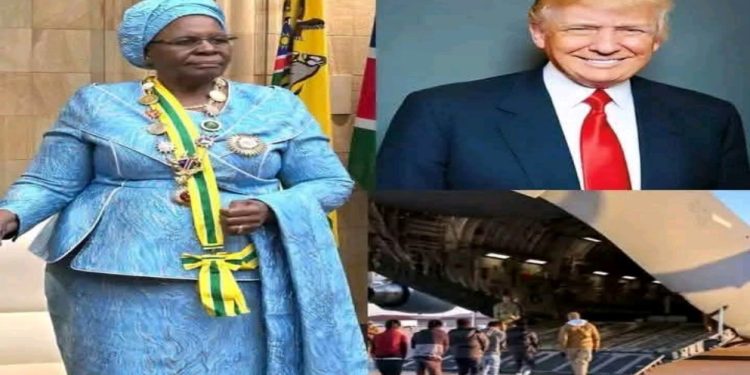By Hassan Osman Kargbo
In a bold and unprecedented move, Namibia’s first female President has taken a strong stance against U.S. immigration policies by ordering the deportation of 500 American citizens. This decision follows an escalation in deportation operations by former President Donald Trump that have disproportionately affected African communities.
The President’s announcement signals not only a commitment to respond to perceived injustices but also a broader assertion of Namibia’s sovereignty in international diplomatic relations.
According to her: “If you cannot enter America without a visa, the same should apply to Namibia,” she declared.
This statement was accompanied by a significant increase in visa fees for American travelers, which she said would serve as both a deterrent and a means of asserting Namibia’s right to determine who enters its borders.
The President’s decision to deport Americans comes as part of a broader appeal to strengthen relations among African nations. “No African should be required to obtain a visa to visit Namibia,” she emphasized, advocating for greater intra-African solidarity and cooperation. This message resonated with many who believe that visa restrictions have historically been tools used by Western powers to control the movement of African citizens and contribute to the exploitation of the continent’s rich natural resources.
In her address, she articulated a clear standpoint: “Visa requirements were invented by colonial powers to keep Africans from pursuing their stolen natural resources abroad. Now, we must turn the tables. If visas were used as a tool of exclusion, we can now use them to protect our interests.” This rhetoric aligns with a growing sentiment among African leaders advocating for greater autonomy and reparation for historical injustices related to colonialism.
The president’s announcement has sparked a mixed reaction both domestically and internationally. Supporters within Namibia praised her assertive leadership style and her commitment to prioritizing Namibia’s interests in the face of perceived exploitation and inequality. They view the deportation order and increased visa fees as justified responses to decades of economic and social inequities stemming from colonial practices.
Conversely, critics of the policy argue that it could strain diplomatic relations with the United States and hinder Namibia’s international standing, particularly in the context of foreign investment and development assistance. This sentiment was echoed by several business leaders who fear that heightened tensions could adversely affect tourism and trade between Namibia and the U.S.
As the situation unfolds, international observers are closely monitoring the implications of the President’s decisions. There are calls for dialogue and negotiation to address the complexities of immigration and foreign relations in an increasingly interconnected world.
Amidst the controversy, Namibia’s leader remains steadfast in her belief that Africa must reclaim its narrative and establish a self-sustaining future, free from external controls. “It is time for African nations to love each other and visit each other without the barriers imposed upon us by others,” she concluded, calling for unity and cooperation among African states.
With the deportation order now in effect and visa fees for Americans doubled, Namibia’s stance is indicative of a new phase in African diplomacy—one marked by resilience, assertion, and a deep commitment to protecting the continent’s interests from historical injustices. The president’s actions serve not only as a response to current political climates but also as a message of empowerment for African nations grappling with their colonial past and striving to shape their futures independently.













